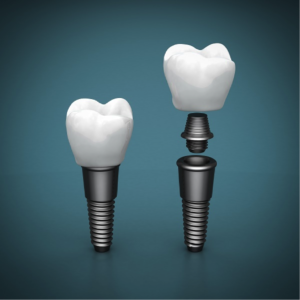
Dental implants have become a popular dental procedure that is now commonplace in virtually every dental office. In fact, patients expect dental implants to be a service that is provided by their dentist. The vast majority of dentists know how to do this straightforward procedure.
As straightforward as the procedure is, there are real risks and possible complications that can occur whether or not there were complications in the procedure. Such risks and complications lead to an unpleasant patient experience that has possible severe repercussions for a dental practice. These consequences can range from a lost patient all the way to a lawsuit. A significant number of dentists fail to adequately prepare for and protect themselves from such risks, complications and problems that can arise from a dental implant procedure.
Jim Downs and Bill Black of the Arrowhead Dental Laboratory share their insights on the four most common problems dentists come across while placing implant to help dentists avoid the consequences should a dental implant or dental implant procedure fail. Below is a short synopsis of the four common problems observed by Downs and Black. The full seminar can be viewed here.
Patient Health Considerations
The patient’s health needs to be assessed before the dental implant procedure. Patients who smoke, have diabetes, or regularly have a bad habit like Bruxism, are at a higher risk of developing complications after their implants are inserted. Sometimes a patient’s health makes the dental implant procedure too much of a risk to do. Dentists should discern whether a dental implant procedure is a doable option for the patient and not be afraid to decline doing the procedure.
Anatomical Issues
For dental implants to be successful and have little chance of complications, the patient’s jaw bone needs to be healthy and strong. Dentists have criteria that the patient’s bone height, width and density must meet in order to proceed with the implant procedure. If the density and quality of a patient’s jaw is insufficient, sinus augmentation may have to be done. This delicate procedure may pave the way for possible sinus inflammation or infection. X-rays and CT scans may have to be done prior to implant surgery to see if sinus augmentation is necessary or doable.
Surgical Considerations
Dental implant surgery, like any other kind of invasive surgery, requires care and know-how on the part of the dentist. Below are some surgical considerations dentists should consider:
- Be aware of possible allergic reactions. Dental implants today are made of titanium, a metal that elicits the fewest allergic reactions. Nevertheless, allergic reactions do occur.
- Expect implant rejection. A dental implant procedure involves inserting a foreign object into a patient’s jaw. It is possible that the patient’s body will reject the implants. Rejected implants will not stay secure so another dental procedure will be needed instead.
- Watch out for nerve and tissue damage. Even the most trained, meticulous dentist can accidently damage surrounding nerves and tissues. There are guidelines concerning how close to nerves an implant can be inserted. Even with these guidelines, accidents happen. To prevent possible patient legal action, dentists should tell the patient about the procedure and its risks and have the patient sign a consent form.
- Avoid overloading. There are often two steps in the dental implant procedure: inserting the posts and attaching the crowns. While patients have shorter recovery times and require less post-op care, complications around the insufficient fusion of the implant and jaw bone can be serious.
Implant Prosthetic Complications
Though implant breakage and bending is rare, it can happen. An implant can also break when it is subjected to excessive force such as a blow to the mouth, an unbalanced crown or long-term, constant teeth grinding or clenching.
In some cases, the implants may become loose or fall out. This is the result of the patient’s jaw bone not fusing properly to the implant.
As with any type of invasive surgery, infection can occur. The most common infection that arises from dental implants is peri-implantitis. This is an infection caused by bacteria that was either present during the procedure or came about after the surgery due to improper dental hygiene. Patients who smoke, have diabetes or thin gums and who have bad dental hygiene are at a greater risk of peri-implantitis.
At Arrowhead Dental, we strive to enhance the skills and tools of dentists so they can excel at giving their patients the best care possible. Dental implant surgery is often done with little or no problems or complications. In the few times a complication comes up, a dentist needs to be prepared. For more dental resources, contact us today.
